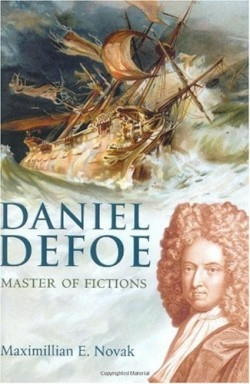
Daniel Defoe
Master of Fictions
Few English writers offer as much mystery and magic as
Daniel Defoe, and very few can match his output, which ranges from Robinson Crusoe—the very stuff of escapism and adventure—to pamphlets on the political, religious, and economic issues of his day. With Defoe, it’s easier to know the works (particularly the novels Moll Flanders, Colonel Jack, and Captain Singleton) than the man who penned them. Defoe, who lived from around 1660 until 1731, fascinates because of the sheer multiplicity of his endeavors, entrapments and escapes. By turns he sought and fled publicity or privacy; by turns he knew fame, fortune, and ruin. He hobnobbed with political leaders as secret agent and pamphleteer; he completed an immense output of ad-hoc work; yet he managed to become a founding father of the realistic novel.
The great service that biographer Novak, a professor at UCLA, does his readers—who should be both numerous and thankful—is to guide them through the labyrinth of Defoe’s multifarious world and to separate the facts from the fictions that Defoe so often wove. Novak’s strength lies in establishing a clear political context and weaving in the what, the why, and the how of Defoe’s prolific work of the moment. Novak excels in the important role of illuminating Defoe the man (and few have been more complex), interchangeably mercenary, dishonest, generous, humane, and progressive. He provides critical insights into the genesis and intellectual and moral content of the major novels, and also concisely comments on a substantial number of Defoe’s periodical and pamphleteering pieces and their impact in shaping the events of the day. (Given that Defoe’s validated oeuvre runs somewhere between 600 and 1,250 works, no biographer can be expected to discuss everything in depth).
Defoe may not be deemed as finely polished as Dryden, as consistently engaging as Addison and Steele, or as critically cogent as Johnson. Nonetheless, he fully merits the apt description Novak cites from an earlier study: “the briskest and most scurrying genius in the annals of English literature.” Novak clearly demonstrates the source of Defoe’s genius: his unflagging capacity to analyze an aggressive society and to highlight its failings while urging needed political, economic, and social change. Those who enjoyed Peter Earle’s World of Defoe (1977) or Paula Backsheider’s Daniel Defoe: Ambition and Innovation (1986)—two accessible works—will find rich reward in Novak’s fully fleshed biography.
Reviewed by
Peter Skinner
Disclosure: This article is not an endorsement, but a review. The publisher of this book provided free copies of the book to have their book reviewed by a professional reviewer. No fee was paid by the publisher for this review. Foreword Reviews only recommends books that we love. Foreword Magazine, Inc. is disclosing this in accordance with the Federal Trade Commission’s 16 CFR, Part 255.
